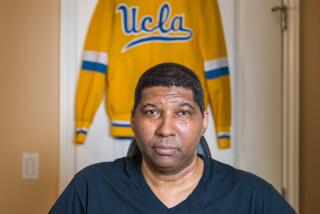Making Ailing Kids’ Pain Go Away for a Day
- Share via
Joe Folender was 9 when he got a lesson in giving--and he never forgot it.
When Folender was growing up lower-middle-class on Manhattan’s Lower East Side, his father, who sewed shirt sleeves at a garment factory, could buy only seats with obstructed views at the circus. “That’s what he could afford,” Folender said. To watch the trapeze, “I had to sort of duck to see.”
But when he went with a rich man--the lawyer who represented his family after Folender was hit by a car--they had “terrific” seats and he got a toy as a souvenir.
“It was no big deal to him,” recalled Folender, 63, but it left a lasting impression. Folender now works to create lasting memories for chronically ill children.
For the last two years, Folender’s Merriday Fun Club has taken more than 600 children and medical staff to Disneyland and Universal Studios, to Laker games and “The Lion King.” He treats them like VIPs.
He picks them up in stretch limousines. He begins and ends theme park trips with orders to go from McDonald’s. He gives each child a disposable camera, and even hires a UCLA film student to videotape the day. A copy of the video goes to everyone who contributed to the event, even the McDonald’s manager.
Folender, the former owner of Weight Watchers franchises in the Midwest, has a realistic attitude about his mission. “We’re not the cure for cancer,” he said. “We want to provide relief to children with life-threatening diseases.”
The Venice resident is no stranger to the world of the seriously ill. He had quadruple-bypass surgery and cared for his late wife, Sandie, during her 13-year fight with breast cancer.
“As an adult, you’re terrified enough” during surgery. He imagines it’s even harder for children.
But the stress of disease melts away when the children enter the park, theater or arena, he said. “Once they’re on the trip, you’d never know they’re ill.” Folender was inspired by programs for sick children, such as tennis player Andrea Jaeger’s Silver Lining Ranch in Aspen. He had grown dissatisfied with sending money to charities through his foundation, which he originally set up for tax breaks.
“Writing checks seemed very hollow, very empty,” he said. So he started his one-man program.
Child life specialists at the four hospitals the club serves say the Merriday Fun Club--named after Folender’s children, Merrin, 33, and David, 37--offers youngsters the type of group activity their illness usually prevents them from enjoying.
The children learn from each other as well. “They realize, ‘I’m not the only sick kid in the world,’” said Rachel Hunt, child life director at UCLA-Harbor Medical Center.
But no matter what their circumstances are, there are two rules for the trips, according to Folender: “Everybody goes to the bathroom and everybody eats before we go out,” he said.
On a recent trip, two limousines pulled up in front of UCLA-Harbor at 8:30 a.m. The drivers arranged backpacks and Egg McMuffin breakfasts along the curb. The kids lined up for a Folender pep talk.
“Who is ready to have a good time?” he asked.
Seven hands shot up. Four of the kids, all Latinos, spoke little English, but when they caught the drift their hands went up too.
“If we don’t have a good time today,” Folender said, “we’re going to do it all over again!”
The kids put on baseball caps and T-shirts with the fun club’s smiling sun logo and piled into the limos, outfitted for the trip with child car seats. Folender also buys tickets for medical staff and volunteers who monitor the kids’ prescription medicines and needs. The itinerary “depends on who the kids are,” he said. “It depends on their strength. We can go all night.”
The chaperons also make accommodations for special needs. They might brush extra salt off the French fries of a child on a restricted diet or administer oxygen to someone with cystic fibrosis.
“We go well prepared for those kids who may have difficulty, who might be in need of a boost,” said Linda Garcia, child life manager at Childrens Hospital Los Angeles.
At Disneyland, two guides met the limo with tickets, two wheelchairs and a stroller. They know how Folender runs his trips. The caravan of 11 kids and eight adults then marched through the park.
Folender said it’s not important for him to learn the intimate details of the kids’ history.
“They know about that every day,” he said. “They don’t have to tell me about it.”
One boy who kept to himself that day was Richie, whose sister recently died. At lunch Folender saw he hadn’t touched an enormous plate of nachos.
“Why aren’t you eating?” Folender asked, putting his arm around the 10-year-old boy. “Would you like to get something else?”
The boy shook his head no. Folender didn’t press him.
Siblings of chronically ill children often face burdens they may not understand, Hunt said. Itzel Rosel, 7, tends to her 17-year-old sister, Amabilia, who, suffering from a spinal tumor, is legally blind, very thin and barely able to walk.
“Itzel is the baby who kind of had to lose her parents through all of this,” Hunt said. But Itzel is a “nurturing, mommy type” who assumes responsibility for her sister.
“I help her put on her clothes,” Itzel said. “Sometimes she wakes me up and tells me, ‘Take me to the bathroom’ and I do.”
But at Disneyland, Amabilia looked out for her sister, making Itzel keep a hand on her wheelchair. “She told me to hold her hand or I can get lost,” Itzel said.
At day’s end, Itzel, Amabilia and the other kids each got $20 in spending money. By then the giving spirit, the same spirit Folender experienced as a boy at the circus, became infectious.
Richie, the boy who recently lost his sister, didn’t spend all his money on himself. He bought his mother a glittery picture frame, decorated with Disney princesses.
More to Read
Inside the business of entertainment
The Wide Shot brings you news, analysis and insights on everything from streaming wars to production — and what it all means for the future.
You may occasionally receive promotional content from the Los Angeles Times.









